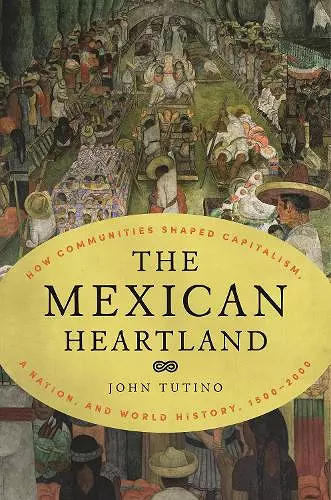The Mexican Heartland
How Communities Shaped Capitalism, a Nation, and World History, 1500–2000
Format:Paperback
Publisher:Princeton University Press
Published:15th Feb '22
Currently unavailable, and unfortunately no date known when it will be back
This paperback is available in another edition too:
- Hardback£42.00(9780691174365)

A major new history of capitalism from the perspective of the indigenous peoples of Mexico, who sustained and resisted it for centuries
The Mexican Heartland provides a new history of capitalism from the perspective of the landed communities surrounding Mexico City. In a sweeping analytical narrative spanning the sixteenth century to today, John Tutino challenges our basic assumptions about the forces that shaped global capitalism—setting families and communities at the center of histories that transformed the world.
Despite invasion, disease, and depopulation, Mexico’s heartland communities held strong on the land, adapting to sustain and shape the dynamic silver capitalism so pivotal to Spain’s empire and world trade for centuries after 1550. They joined in insurgencies that brought the collapse of silver and other key global trades after 1810 as Mexico became a nation, then struggled to keep land and self-rule in the face of liberal national projects. They drove Zapata’s 1910 revolution—a rising that rattled Mexico and the world of industrial capitalism. Although the revolt faced defeat, adamant communities forced a land reform that put them at the center of Mexico’s experiment in national capitalism after 1920. Then, from the 1950s, population growth and technical innovations drove people from rural communities to a metropolis spreading across the land. The heartland urbanized, leaving people searching for new lives—dependent, often desperate, yet still pressing their needs in a globalizing world.
A masterful work of scholarship, The Mexican Heartland is the story of how landed communities and families around Mexico City sustained silver capitalism, challenged industrial capitalism—and now struggle under globalizing urban capitalism.
"In this formidable work of scholarship, Georgetown University historian John Tutino recounts Mexico’s long journey to modernity from the standpoint of small communities surrounding Mexico City. This ambitious exercise spans five centuries to analyze how these communities ‘built, sustained, subsidized, resisted and changed capitalism’ in its various phases from silver-based imperial capitalism under Spanish rule to the shift from national capitalism to liberal globalism in the late 20th century."---José Ángel Gurria, Finance & Development
"This longue-durée Braudelian study of Mexico draws from compelling and fascinating regional and local studies. . . . Based on the author’s own original research as well as on broad scholarship from history, anthropology, sociology and political science in both English and Spanish that brings academic perspectives into dialogue beyond the conventional boundaries of disciplines and academic traditions."---Moramay López-Alonso, EH.net
"Combining economic and social history, Tutino explores the 500 year trajectory that saw central Mexico's transition from a major player in the world market even as the region remained largely autonomous from it to an economic afterthought buffeted by the hollowing out of the region by the neoliberal turn."---Andrae Marak, World History Connected
"What Tutino has done is remarkable, working up and down the scales of analysis from villages to the world market, from gender relations of households to imperial policy."---Jeremy Adelman, American Historical Review
"Tutino demonstrates the continued value and validity of an interpretation based on historical materialism. The book is an important contribution to the study of Mexico, globalization, and capitalism."---Robert W. Patch, Estudios Interdisciplinarios de América Latina y el Caribe
ISBN: 9780691227313
Dimensions: unknown
Weight: unknown
512 pages